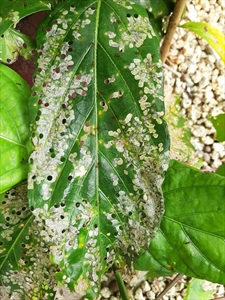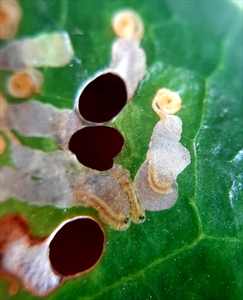- Widespread. South Asia (India), East Asia (China, Japan), Africa (Madagascar), North and South America, Europe, Oceania, In Australia, Tonga.
- Seriousness and effect on yield unknown. On noni; no other hosts recorded.
- Species unknown. Likely, eggs laid into underside of leaves, larvae make mines beneath leaf surface, narrow at first expanding into a blotch. When mature, larvae brown with black heads, one or two per blotch. Before pupation, larvae cuts oval 6 mm diameter cases from the leaves, dropping on silken threads attaching them to bark or fallen leaves.
- Adults, small day-flying moth, brown wings with incomplete metallic white bands, and fringed hindwings.
- Cultural control: none recommended as insufficient evidence that moth effects yield.






